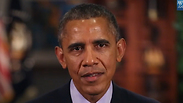
The US-Israel divide
Op-ed: The cultural gap that exists between Americans and Israeli goes beyond the different languages they speak, and the current spat between Israel and the US is all about divides.
As the average Israeli, too, I traveled for a year in South America. I went from city to city, from location to location, from high mountains to beaches with palm trees with waves that God created specifically for surfing. Some 15 years have gone by since, but the feeling remains somewhere inside me, the freedom still in my head. I spent almost six years in the army and another year traveling – a particularly long growing-up period, a part of what shapes the character of someone who was raised in a country that refuses to decide what it will be when it grows up.
When you're far from home, it's easier for you to explain to yourself who you are. It's easier, too, to forget the rules you brought along with you. During the course of my travels, I met religious individuals who had decided to take a break from keeping kosher for a year, left-wingers who dropped their leftist views for a while, and atheists who moved from one Chabad House to another with the zeal of newly religious Jews.
Israelis travel to get away from it all, but actually stick together, staying in the same hostels, hiking the same trails, dancing at the same carnivals. I was the same; but at the same time, I found myself doing my part to promote foreign relations.
Those were different times. The Lehava organization wasn't around back then to prevent assimilation, and I met an American girl. We traveled around together for several weeks, hiking and talking a lot. It was the first time I really understood the meaning of a cultural divide. Israelis I could decipher from their very first word; I struggled to understand her even after her sentences came to an end.
I have met Americans of all kinds since – simple folk and VIPs, students and senior politicians. I have American friends, family in New Jersey, and Hemi, who immigrated to Israel from Brooklyn but still thinks he's at Woodstock in the 1960s. I've learned to understand, and I've learned primarily that the divide exists no matter one's command of English.
The gun on the table
The current spat between Israel and the United States is all about divides. Prime Minister Benjamin Netanyahu understands full well the policy of US President Barack Obama, and the White House has a good understanding of Israel's interests – but they are unable to bridge the divide. Obama is bent on reaching an agreement with Iran at any price. He has no intentions of stopping Iran using military means. The economic pressure is not effective enough. China, Vladimir Putin's Russia and all the countries that aren't fond of the United States have not imposed the sanctions rigidly.
Over the course of the past six years, the Iranian nuclear program has been the only thing that has made any headway. Iran is a nuclear threshold country even if no one is saying so. The only question that remains is: When will we wake up one morning to hear that Tehran has conducted its first successful nuclear test?
A few years ago, I published a book together with Yaakov Katz, a journalist at the time, who now serves as an adviser to Naftali Bennett on Iran. Our conclusion was that Israel has no choice but to launch a military strike. Iran is striving for regional hegemony, to become a superpower. Its religious foundations are less important than its political objectives. It's unlikely to launch a nuclear strike against Israel, but it is certainly capable of turning the Middle East into the black hole of the world.
According to a Wikileaks report, Bahrain King Hamad bin Isa Al Khalifa met in November 2009 with US General David Petraeus to warn him about Iran's nuclear aspirations. He also demanded military action. Obama knows all about that conversation, along with dozens more with other Arab leaders. They are all concerned; none of them trusts Iran. It all boils down to a nuclear arms race – a new Middle East.
Israel has been faced with making a decision on military action to prevent such a scenario on at least one other occasion in the past. Under domestic and international pressure, however, Netanyahu and Ehud Barak folded. Historians would do well one day to look into the decision-making process at the time – but that's a different story. The bottom line, as of today, is that the military option is pretty much off the table.
What remains for the State of Israel (and not just for the prime minister on the eve of the elections, but for all of us) is to rely on the United States' ability to put pressure on Iran. The gun on the table now is no longer our gun. If it's removed, nothing will remain.
Netanyahu is right in believing that addressing Congress is an effective tactic. In the end, however, he needs to weigh up the benefits against the cost. Stern warnings can emanate from Jerusalem too. He could make his point by addressing the annual AIPAC conference. The criticism he has come under is justified, but we have to remember that the address to Congress is not the problem - Obama's policies are.
Obama commented this past week on the terror attack at the kosher supermarket in Paris. He claimed that the perpetrators chose their target at random and that they wanted to "hurt some folks" – a disconnected rhetoric, devoid of Islamic gunmen and Jewish victims. Obama is not anti-Semitic and he's not anti-Israel either. He is merely finding it hard to bridge the divide between liberal Washington and the Middle East. He finds it hard to recognize radical Islam.
As president, Obama has failed in almost every international arena. He is partly responsible for the instability in Egypt, Libya and Ukraine. Over the next two years, he has to notch up some kind of achievement – like a deal with Iran. A video clip that the American media circulated this week shows Netanyahu addressing Congress in 2002 and warning about nuclear arms in Iraq. Netanyahu was adamant. The clip came to show that Netanyahu was wrong back then and is wrong again today.
But Iraq is not Iran. Iran's nuclear program is a fait accompli. No deal can turn back the clock, unless Tehran agrees to full international supervision and the dismantling of the facilities (five that we currently know about). And that's not going to happen.
The divide between Israel and the United States exists no matter who occupies the Prime Minister's Office. The diplomatic struggle between the two countries is inevitable. Even if Isaac Herzog is elected prime minister and he and Obama stroll hand-in-hand under the moonlight together, the reality of the situation isn't going to change. The decisions that Ariel Sharon, Ehud Olmert and Netanyahu in particular failed to take over the past six years are a fait accompli too. Israel's goal now is to figure out how to cause Obama to act contrary to his own interests.











